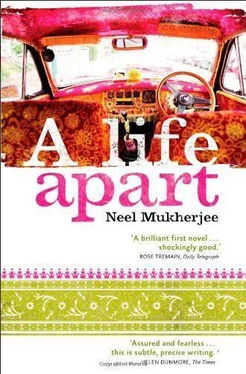She notices something, just a small shift, something tinily riven, in the air between them, something so small as to be absent.
Almost.
She asks, ‘Are you OK?’
Yes, he is. Because he isn’t. Because he’s survived not being OK.
Bidisha Ghosh was the proudest mother in Jadavpur. Not only were her two boys fair, which drew appreciative comments from neighbours — Look at your boys, like two little sahibs — but they also went to an English-medium school, cementing further the comparison with sahib. But above all, they were known to be the two most perfectly disciplined boys around. Or, to shift the focus, Bidisha-di was the byword in Grange Road for good parenting. She ruled with an iron hand, like some furious goddess from the Hindu pantheon, quick to take offence and send down punishment. There was no woolliness about her, no indulgence; it was tough love, love like the grip of a vice. If it didn’t constrain and keep the boys within its jaws, they would grow up as spoilt, ill-educated trash like the loafers and chengra s who hung out in street corners, whistled at the girls, smoked, drank and did no work. Vigilance, constant, unremitting vigilance: if she let her guard down for a split second, the boys would be ruined.
To this end, she had cultivated the persona of the ideal mother who was defined by her readiness to discipline and punish at the slightest hint of wayward behaviour. For what was love if it did not mould and reform? Love spoiled, punishment corrected. The heart could be of gold, but its appearance and expression had to be of tempered steel.
Everyone in the neighbourhood knew that the boys were being brought up in a household with four bums. Their uncles were the worst examples to any child: they hadn’t had the benefit of education; they were boneidle, sleeping in until lunchtime; they were unemployed freeloaders; they smoked and drank; Pratik had a gambling habit; it was suspected that Pratim was on brown sugar; they stole, lied, cheated, beat up their mother, sang Hindi film songs loudly and got into fights. Bidisha had had no choice in moving in here after they had to give up their flat in genteel Park Circus. She certainly didn’t have any power to contain her brothers’ behaviour and lifestyle, so she decided to concentrate on the children instead — if she couldn’t change their environment and make it wholesome for them, she could throw all her energy into making the boys impervious to such malign influences. She built a chinkless wall around Ritwik and Aritra to protect them from the fire all around. In the process, she shut out all the light and air as well.
Being a strict parent brought high marks from everyone who knew them. It was as though this whole act of bringing up the boys were being played out to a crowd of exacting judges and watchers whose every nod of approval, every pursed lip of criticism counted as plus or minus points. She was being watched and marked by this gallery, inside and outside; she had to perform well, win and walk off with the grand prize. So the more she ordered her boys in sharp, staccato bursts, the more this theatre audience approved, the more she barked and shouted, the more they were pleased. She was a hard mother, there was no pussyfooting and molly-coddling, no slipping up or cracks in the performance. She was lean, mean and streamlined; every inch of visible tenderness had been trimmed away like fat off meat. The only person left was the role itself.
Her ordinary tone of voice to the children was like whiplash. Get your books. Wake up. Go and have a bath all had the sharp report of a dead, dry twig breaking in silent forest floors. They were always orders, delivered with imperiousness and something approaching distaste, as if the boys had just been bought from a slave market; the spectators approved. And then there were threats articulated through clenched teeth and with rolling eyes: she managed to make ordinary situations a condition of cold, rib-stabbing menace. It’s nearly mid-day, I’ve been asking you to go and have a bath for the last hour, if you don’t go now, I’ll tear you to pieces. Her threats of violence got more and more baroque but they were the common currency of the Bengali household: I’ll batter your face with a shoe, I’ll lash you with the broomstick , or I’ll break every tooth in your face .
She was always on this edge of fury, like a restrained storm, about to burst any moment. Every aspect of her, every word, every intake of breath, every movement of her eyebrows seemed to have been dipped in an acid bath of anger; in an instant her relatively benign demeanour could change, as if some inner demon had flipped a trip switch with a sudden surge of current. She shouted and raged, the neighbours came out on to their balconies or heard every single word through their open windows and commented, ‘Bidisha-di is so scary. The boys fear her as if she were Yama.’ It was a commendation of the highest order: it meant the boys would grow up straight.
That was the thrust of Moral Science classes in school as well. The central metaphor was of an upright tree, growing up towards light, growing up tall and straight, because the careful gardener had tended it in its youth, guided its pliable green twigs and branches, supported it with twine, wire, stakes, trained its wayward shoots and tendrils around strong rods. Such was the importance of discipline and correction during the early years, when children could easily go astray, like the crooked plant which no one looked after so it became a jumbly, untidy mess and was uprooted with the noxious weeds and thrown into the flames. No teacher tired of this parable and, at home, Bidisha discovered that it sounded a sympathetic chord in her when she supervised the boys’ homework. Practically every week the parable was wheeled out in that storm-cloud tone of voice. Neighbours whispered respectfully, ‘Bidisha-di is a perfect mother. Look how well she disciplines her boys. Look how wonderfully she keeps them on the straight and narrow.’ Her fame spread, her name was on every tongue.
The incessant shouting became an issue between Bidisha and her husband. He was a kind, gentle, elderly man who believed children should be brought up with love and tenderness, should never be shouted at, and should never, never be hit. Whenever she went on the rampage, he quietly asked her to keep her voice down. ‘Why do you have to shout, Bidisha,’ he said, ‘why can’t you just make your point softly but firmly? There’s no need to bring the house down.’
This fanned the fire to a mighty crackling roar. ‘You keep quiet. You’re spoiling the boys; all this business of affection, affection, affection, it’s had them dancing on our heads,’ she shouted, her voice rising by a few more decibels as her sentence neared the end.
He made another gentle attempt. ‘Can’t you just speak to them? And how exactly do you see them behaving badly? They seem all right to me.’
She played her trump card. ‘You’re not helping things by criticizing me in front of everyone. This will later give the boys licence to do the same,’ she said. And then she lobbed the little grenade: ‘Fine, if you think you know best, you deal with them. You bring them up. You feed them, make them do their homework, take them to school and bring them back, you do everything.’ With every clause, her voice rose, till she almost spat out the last word and rushed out of the room. In the kitchen she could be heard handling utensils so noisily that they were afraid she was breaking half of them.
This silenced their father. He gave up in despair; he wasn’t combative enough. She could only be tackled by her means: shouting, aggression, that precarious positioning on the precipice of violence. He didn’t have those in him.
Читать дальше












